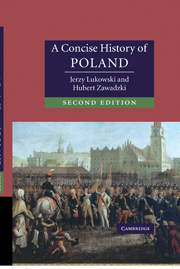Book contents
- Frontmatter
- Contents
- List of illustrations
- Preface to the second edition
- Preface to the first edition
- A note on Polish pronunciation
- Chronology
- PART I POLAND, TO 1795
- PART II POLAND, AFTER 1795
- 4 CHALLENGING THE PARTITIONS, 1795–1864
- 5 AN ERA OF TRANSFORMATION, 1864–1914
- 6 INDEPENDENCE REGAINED AND LOST, 1914–1945
- 7 COMMUNISM AND THE COLD WAR, 1945–1989
- 8 A NEW REPUBLIC, 1989–
- Generalogical charts of Polish rulers
- List of heads of state, presidents, Communist Party leaders (1918–2005)
- Bibliography
- Index
- Title in series
5 - AN ERA OF TRANSFORMATION, 1864–1914
Published online by Cambridge University Press: 05 June 2014
- Frontmatter
- Contents
- List of illustrations
- Preface to the second edition
- Preface to the first edition
- A note on Polish pronunciation
- Chronology
- PART I POLAND, TO 1795
- PART II POLAND, AFTER 1795
- 4 CHALLENGING THE PARTITIONS, 1795–1864
- 5 AN ERA OF TRANSFORMATION, 1864–1914
- 6 INDEPENDENCE REGAINED AND LOST, 1914–1945
- 7 COMMUNISM AND THE COLD WAR, 1945–1989
- 8 A NEW REPUBLIC, 1989–
- Generalogical charts of Polish rulers
- List of heads of state, presidents, Communist Party leaders (1918–2005)
- Bibliography
- Index
- Title in series
Summary
The crushing of the insurrection of 1863–4 dealt what seemed to be a final and fatal body blow to the cause of Polish independence. A new wave of exiles, as defiant but not as illustrious as their predecessors of 1831, sought sanctuary in the west. Militant radicals amongst them joined the cause of international socialism, and many went to fight, and perish, on the barricades of the Paris Commune. The moderates set about devising no less unrealistic plans to preserve the national cause. Some of their ideas and activities were to germinate in the long run into vigorous socialist and nationalist movements within Poland, but at the moment, with every year that passed, the Polish Question as an international issue faded more and more into the distant background. The Russo-Turkish war of 1877–8 and the resulting Eastern Crisis raised a few desultory hopes, only to dash them. Indeed, the 1870s and 1880s witnessed a reinvigorated campaign by both the Russian and Prussian authorities to weaken still further the Polish character of their respective shares of old Poland. It was ironically in Austria, which had been least well disposed to Polish national aspirations in the early decades of the century, that Polish fortunes were to improve.
The distinct administrative status of the Congress Kingdom was much reduced, and Russian was imposed as the language of administration and of the courts.
- Type
- Chapter
- Information
- A Concise History of Poland , pp. 182 - 216Publisher: Cambridge University PressPrint publication year: 2006

